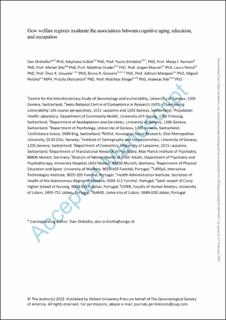| dc.contributor.author | Orsholits, Dan | |
| dc.contributor.author | Cullati, Stéphane | |
| dc.contributor.author | Ghisletta, Paolo | |
| dc.contributor.author | Aartsen, Marja | |
| dc.contributor.author | Oris, Michel | |
| dc.contributor.author | Studer, Matthias | |
| dc.contributor.author | Maurer, Jürgen | |
| dc.contributor.author | Perna, Laura | |
| dc.contributor.author | Gouveia, Élvio | |
| dc.contributor.author | Marques, Adilson | |
| dc.contributor.author | Peralta, Miguel | |
| dc.contributor.author | Marconcin, Priscila | |
| dc.contributor.author | Kliegel, Matthias | |
| dc.contributor.author | Ihle, Andreas | |
| dc.date.accessioned | 2022-10-10T09:21:57Z | |
| dc.date.available | 2022-10-10T09:21:57Z | |
| dc.date.created | 2022-02-02T07:58:39Z | |
| dc.date.issued | 2022 | |
| dc.identifier.issn | 1079-5014 | |
| dc.identifier.issn | 1758-5368 | |
| dc.identifier.uri | https://hdl.handle.net/11250/3025020 | |
| dc.description.abstract | Objectives: Previous studies have shown the importance of individual markers of cognitive reserve, such as education and occupation, for cognitive health in old age. However, there has been only little investigation so far on how this relationship varies across contexts.
Methods: We analyzed data from the Survey of Health, Ageing and Retirement in Europe, using second-order latent growth models, to assess the moderating role of welfare regimes on the relationship between education and occupation skill level in explaining overall cognitive functioning and decline in old age. Our sample includes 13 European countries using data from five regular waves of the survey (2004-2007 & 2011-2015) and two retrospective ones (2008-2009 & 2017). Cognitive functioning was modelled as a latent variable measured by immediate and delayed recall, verbal fluency, and numeracy.
Results: 74,193 participants were included from the survey. Our analysis showed that the association of education with cognition was weaker overall in Scandinavian countries, but stronger in Southern European countries, relative to Bismarckian ones. However, educational differences in the decline of cognition were more pronounced only in Scandinavian compared to Bismarckian countries. Additionally, higher skilled occupations in Scandinavian countries had better overall functioning compared to the same occupations in Bismarckian countries but there was no difference in the decline in cognitive functioning.
Discussion: Our findings indicate that the associations of cognitive functioning and its decline with individuals’ cognitive reserve markers (education and occupational skill level) vary according to welfare regimes, showing the importance of contextual factors in cognitive ageing processes. | en_US |
| dc.description.sponsorship | This work was supported by the Swiss National Science Foundation (grant number: 10001C_189407) to AI and by the Swiss National Centre of Competence in Research LIVES – Overcoming vulnerability: life course perspectives, granted by the Swiss National Science Foundation (grant number: 51NF40-185901). | en_US |
| dc.language.iso | eng | en_US |
| dc.publisher | Oxford University Press | en_US |
| dc.relation.ispartofseries | The journals of gerontology. Series B, Psychological sciences and social sciences;Volume 77, Issue 9 | |
| dc.subject | Life courses | en_US |
| dc.title | How welfare regimes moderate the associations between cognitive aging, education, and occupation | en_US |
| dc.type | Peer reviewed | en_US |
| dc.type | Journal article | en_US |
| dc.description.version | acceptedVersion | en_US |
| dc.rights.holder | © The Author(s) 2022 | en_US |
| cristin.ispublished | true | |
| cristin.fulltext | postprint | |
| cristin.qualitycode | 1 | |
| dc.identifier.doi | https://doi.org/10.1093/geronb/gbac013 | |
| dc.identifier.cristin | 1996757 | |
| dc.source.journal | The journals of gerontology. Series B, Psychological sciences and social sciences | en_US |
| dc.source.volume | 77 | en_US |
| dc.source.issue | 9 | en_US |
| dc.source.pagenumber | 24 | en_US |
| dc.relation.project | Schweizerische Nationalfonds: 10001C_189407 | en_US |
| dc.relation.project | Schweizerische Nationalfonds: 51NF40- 185901 | en_US |
